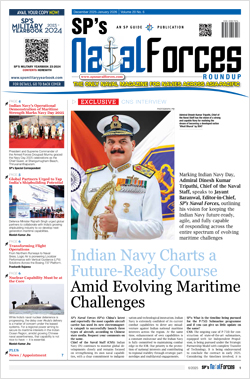INDIAN ARMED FORCES CHIEFS ON OUR RELENTLESS AND FOCUSED PUBLISHING EFFORTS

The insightful articles, inspiring narrations and analytical perspectives presented by the Editorial Team, establish an alluring connect with the reader. My compliments and best wishes to SP Guide Publications.

"Over the past 60 years, the growth of SP Guide Publications has mirrored the rising stature of Indian Navy. Its well-researched and informative magazines on Defence and Aerospace sector have served to shape an educated opinion of our military personnel, policy makers and the public alike. I wish SP's Publication team continued success, fair winds and following seas in all future endeavour!"

Since, its inception in 1964, SP Guide Publications has consistently demonstrated commitment to high-quality journalism in the aerospace and defence sectors, earning a well-deserved reputation as Asia's largest media house in this domain. I wish SP Guide Publications continued success in its pursuit of excellence.
- Global Partners Urged to Tap India's Shipbuilding Potential: Rajnath Singh at Samudra Utkarsh
- All about HAMMER Smart Precision Guided Weapon in India — “BEL-Safran Collaboration”
- India, Germany deepen defence ties as High Defence Committee charts ambitious plan
- G20 Summit: A Sign of Global Fracture
- True strategic autonomy will come only when our code is as indigenous as our hardware: Rajnath Singh
- India–Israel Joint Working Group Meeting on defence cooperation to boost technology sharing and co-development
Vietnam Joins BRICS
Joining BRICS is a strategic step, aligning Vietnam with a bloc that collectively represents over 47 per cent of the world's population and a significant 40 per cent share of global GDP
 |
The Author is former Chief of Staff of a frontline Corps in the North East and a former helicopter pilot. He earlier headed the China & neighbourhood desk at the Defence Intelligence Agency. He retired in July 2020 and held the appointment of Addl DG Information Systems at Army HQ. |

On June 13, 2025, the world was occupied with the escalation in the Middle East with Israel launching an operation, called "Rising Lion", killing a number of Iranian commanders, scientists and the head of the country's powerful Revolutionary Guard. This escalation would ultimately lead to the US joining the conflict as Israel has been persistently keen since start of the flare up on October 7, 2023. Ten days later, on June 22, 2025, the US Air Force and Navy attacked three nuclear facilities in Iran, viz., the Fordow Uranium Enrichment Plant, the Natanz Nuclear Facility, and the Isfahan Nuclear Technology Centre with fourteen GBU-57A/B MOP (Massive Ordnance Penetrator). President Trump claimed that the bombing had obliterated Iran's nuclear enrichment facilities though his own intelligence agencies as well as the IAEA forcefully and very rationally, contradicted his claims. Notwithstanding the bombast and the callous unilateral actions by the US, the very next day President Trump declared a ceasefire on social media. The uneasy truce has largely held, so far.
With Vietnam formally joining the block, ignoring US efforts to shape Vietnam along with South Korea and Japan as a counterweight to China, the move acknowledges the shifting gravity of global geo-economics
Vietnam's BRICS Entry: A Calculated Geo-Economic Move
Exactly on the same day, June 13, 2025, something more momentous was taking place, finding little traction in the west-led narratives-driven corporate media. In its capacity as pro tempore BRICS Chair, the Government of Brazil announced the formal admission of Vietnam as a partner country of the group. Ignoring or trivialising the BRICS expansion by western leaders and media may have been more deliberate than incidental.

Back in 2023, after the Johannesburg summit where the expansion plans of BRICS was first declared, the western media had reacted with palpable trepidation. "The expansion of the BRICS group is the defeat for von der Leyen and Borrell," an article with this title appeared in the German Berliner Zeitung, alluding to the President and Vice-President of the European Commission respectively. The Wall Street Journal noted that Beijing and Moscow support the expansion of the BRICS "as a political entity and an independent trading bloc as part of efforts to increase its influence as a counterweight to the West."
The recent actions by the Trump administration including military and tariff wars are a fight to preserve this neo-colonial hegemony which is under serious threat from the BRICS
With Vietnam formally joining the block, ignoring US efforts to shape Vietnam along with South Korea and Japan as a counterweight to China with offers of 'friendshoring' manufacturing which were forced to exit China due to the ongoing tariff wars, the move acknowledges the shifting gravity of global geo-economics.
Vietnam's relationship with the United States, elevated to a comprehensive strategic partnership in September 2023, has faced challenges since the re-election of President Donald Trump. The Trump administration has imposed stringent tariff barriers and scrutinised Vietnam's trade practices, particularly its role as a potential conduit for Chinese goods entering the US market.
Hanoi, acutely aware of these tensions, seeks to balance its economic ties with the US by deepening engagement with other global players. Joining BRICS is a strategic step in this direction, aligning Vietnam with a bloc that collectively represents over 47 per cent of the world's population and a significant 40 per cent share of global GDP.
The fightback for a reworked global trade structure, equitable financial architecture and a reset of political alliances that gives a fair chance for the global South is being led by the BRICS
Of course, it must be admitted that Vietnam's status as a partner country, rather than a full BRICS member, reflects a cautious foreign policy, aligning with its "bamboo diplomacy." This half-step allows Hanoi to engage with the bloc without fully committing to its geopolitical agenda, which is heavily influenced by China and Russia.
US Trade Pressure and Its Potential Fallout
On July 2, 2025, President Trump announced a 'trade deal' with Vietnam according to which while US goods like wheat, beef and dairy products entering Vietnam will face zero-tariff, imports from Vietnam will be slapped with a blanket 20 per cent tariff. All transhipped goods through Vietnam, most originating from China will face a stiffer 40 per cent. While on the surface, it looks like a winner-takes-all situation in favour of the US, the impact on the ground can be very different. In 2024, imports from Vietnam into the US totalled a whopping $140 billion which includes apparel, footwear, electronics, furniture and industrial components. It's a no brainer that the US importers will pass on the higher costs due to the tariffs imposed now, raising prices for everything like school bags or shoes or household electronics like blenders and dish washers for the American consumers. The US will pay a heavy 'tariff volatility premium', but Vietnam will suffer more as almost 30 per cent of its GDP is tied to exports to the US. That's the catch going forward.
That Vietnam took the plunge to join the BRICS bandwagon after carefully weighing the long term impacts of displeasing the US is a pointer to the reality of de-dollarisation of the global economy gathering more winds in its sails

With less than five per cent of world population, the US uses one-third of the world's paper, a quarter of the world's oil, 23 per cent of the coal, 27 per cent of the aluminium, and 19 per cent of the copper. At a broader count, despite being just 12 per cent of the global population, the US and Western Europe account for 60 per cent of private consumption spending. How do they manage to pay for so much of resources without burning a hole in their budgets? The post-WWII global financial architecture led by US Petrodollar, fashioned and sustained through threat of sanctions, regime change operations, inspired coloured revolutions and brute military force by the US is the answer to this piercing question. The recent actions by the Trump administration including military wars and tariff wars are a fight to preserve this neo-colonial hegemony which is under serious threat from the BRICS with its ten member countries that includes oil exporting Iran and ten partner countries with manufacturing powerhouse Vietnam as the latest addition.
The Bigger Picture: BRICS vs Western Economic Dominance
The fightback for a reworked global trade structure, equitable financial architecture and a reset of political alliances that gives a fair chance for the global South is being led by the BRICS. The Rio BRICS Summit from July 6-7, 2025, being attended by Prime Minister Modi has a strong agenda. Apart from an explicit condemnation of terrorism in any form (No Good-Taliban-Bad-Taliban Quixotic pill), India is pushing for trade settlements in national currencies, a step that would lessen the Global South's dependence on the US dollar.
The US actions including bombing Iran which has chosen to trade oil in non-dollar arrangements and imposing hefty tariffs on Vietnam which decided to join the BRICS are part of a larger fightback by the declining hegemon. That Vietnam took the plunge to join the BRICS bandwagon after carefully weighing the long term impacts of displeasing the US is a pointer to the reality of de-dollarisation of the global economy gathering more winds in its sails. From strong anti-terror messaging to leading conversations on trade reform and health equity, BRICS is intent on playing a central role in shaping the world's future. It is the new G20.





